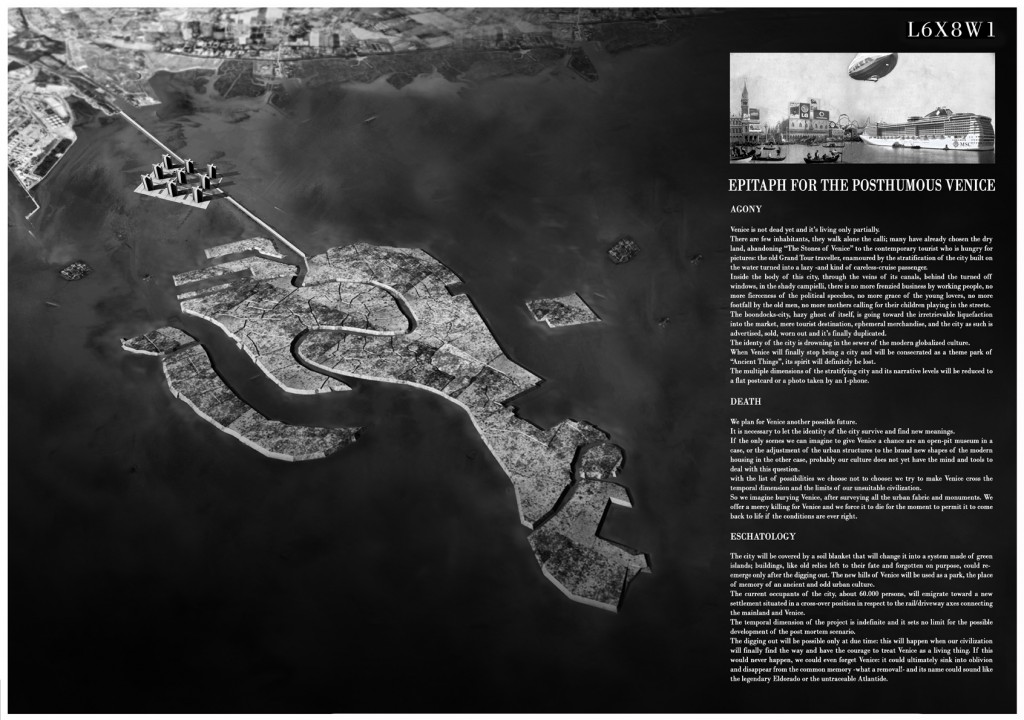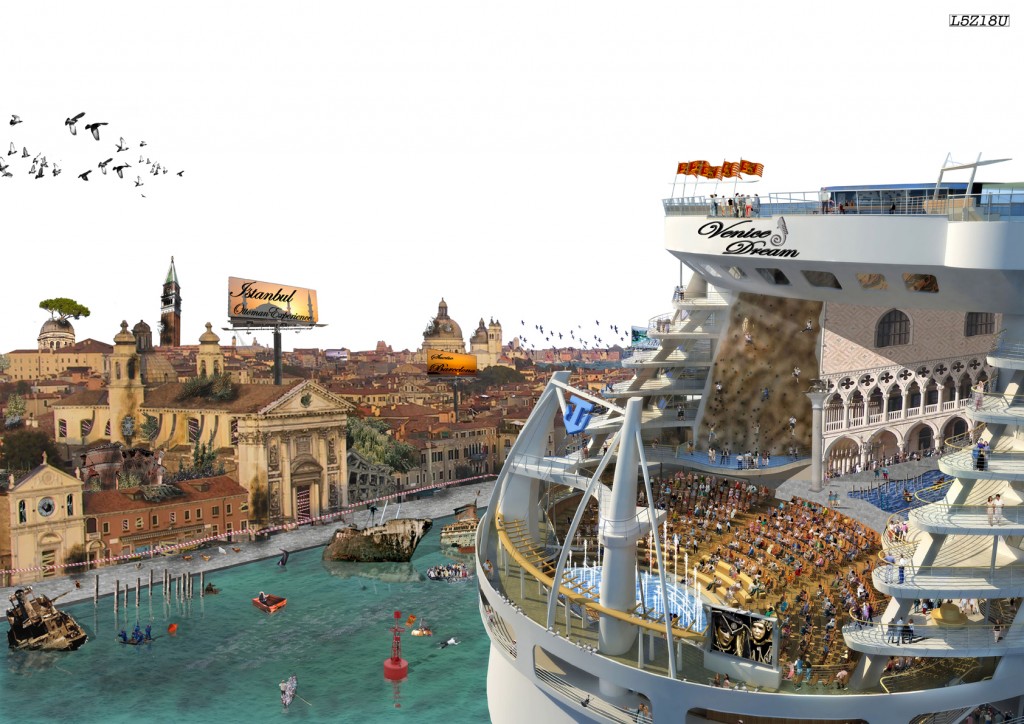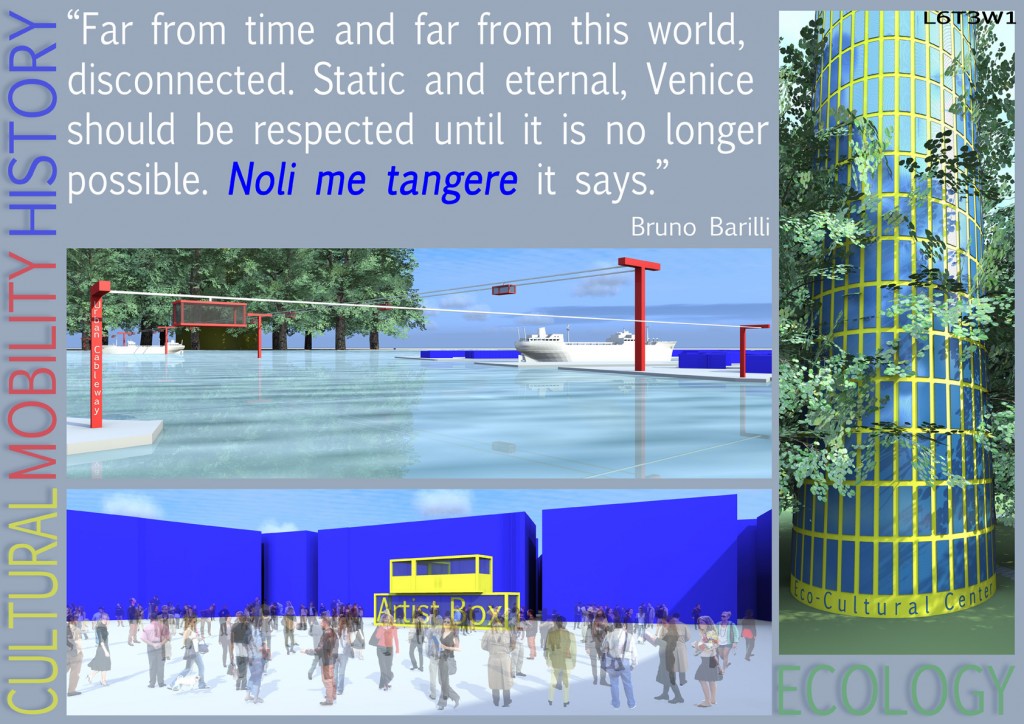Info:
Title: Mobility Ecology Cultural - Code: L6T3W1Contest: Venice / 2011
By: A. Tosatto / L. Fusato
Views: 2482 Likes: 0
Votes:
BJARKE INGELS4 NERI OXMAN6 ELENA MANFERDINI1 MARIA LUDOVICA TRAMONTIN4 BOSTJAN VUGA13.2
Mobility Ecology Cultural
“Far from time and far from this world, disconnected. Static and eternal, Venice should be respected until it is no longer possible. Noli me tangere it says.” Bruno Barilli Art and creativity can heal Venice, which is in environmental decline, but not dead. The city of art, the most beloved city in the world for its history and beauty. A magic theatre where people also exist in reality. Without touching its past -”noli me tangere” – we will connect it to the present and future, keeping intact the history which is the city’s pedestal .
Our purpose is to seek a dialogue between the grandiose yesteryears, today and tomorrow.
In this context ecology implies to the establishment of a vast parkland outside the historical city, spreading into nearby Marghera. This project will combine the restoration and reclamation of these areas. Focusing centrally on the redeveloped village green through the development of an immense contemporary cultural arts center. It will become the connection between the history and future of Art. A contemporary building that will not overpower the ancient aura of Venice, but provide it with something more. Becoming the modern shadow of Venice. Focusing on the promotion of contemporary art and music. A multidisciplinary cross cultural platform. This arts center including the park will entail within the context of its ecological focus, geothermal energy and solar power. In correlation with the redevelopment of these industrial areas, it will be moving towards self sustaining green energy sources.
Eradicating factories and pollution Art and Nature will prevail.
Mobility will keep this dream together through a cableway linking Marghera and Mestre to Venice as these places are isolated. An optimal mode of transport for workers, outliers and tourists to move around Venice. The cableway will surround Venice but will not be invasive on it’s irrevocable architecture. Crowds of tourists dash the people who live in the city, and a lot of them are moving out. The cableway will give more dynamism and velocity to this ever growing problematic aspect of the nature of this beautiful city.
Two forms of urban cableway will be realised, one placed at a level to avoid the passage of the cruise ships the other of a lesser height.
Culture will be represented by six mobile structures (container of 20’ – 40’ – High – Cube of 45’) scattered in and throughout Venice, one for each district (sestiere) and more on other islands. They will be assigned to artists through public competition and will be utilized as studios, where artists can work “with the city”.
The works produced by the artists will be purchased by the city and placed in the cultural center of Marghera for a large scale exhibition.
To create the container, elements from the factories of Marghera will be re-used and recycled. Artists will have the opportunity to design the installation of their works within each container.
A non invasive approach to the placement of the containers will take precedence.
Venice will offer opportunities for the exploration and development of the arts, such as in the green heart of Marghera.
Venice is inhabited with many young students, it should be a priority to provide them with an energetic and stimulating platform for expansion in relation to their city.
A new Re-population: people should not escape from the city but be provided with a functional way to co-exist, they are in need of a new liveable island.
Info:
Title: Mobility Ecology Cultural
Time: 6 giugno 2011
Category: Venice
Views: 2482 Likes: 0
Tags: Adriatic Sea , Art , Contemporary art , Fusato , Galleries , Marghera , Mestre , Tosatto , Venice , Visual arts









